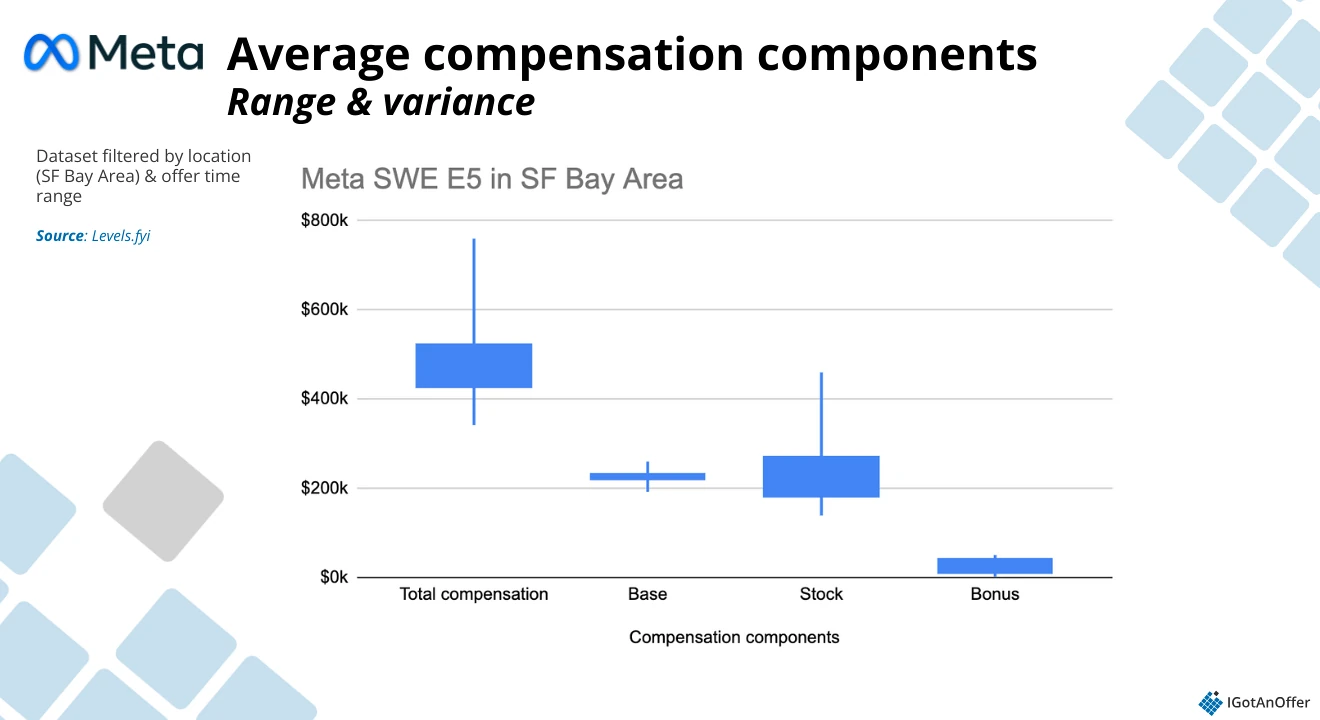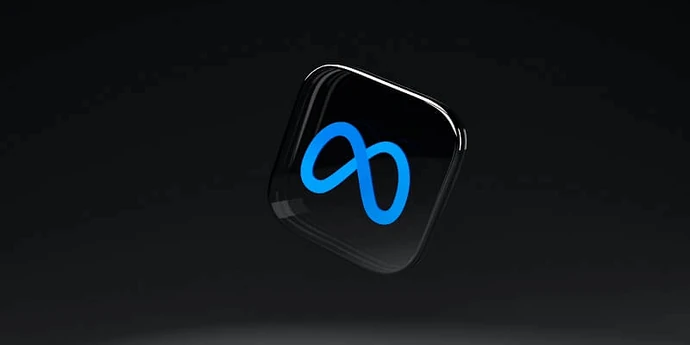You got an offer at Meta. Congratulations! Now it’s time to maximize your offer.
The difference between a good Meta offer and a great one often takes a single conversation. Many candidates leave a $50k+ increase on the table because they fear the Meta offer negotiation process.
We’re here to change that. In this guide, we show you five actionable steps you can take so you can have the confidence to negotiate and secure the compensation you deserve.
Here’s an overview of our recommended steps:
- Understand Meta’s compensation
- Find weaknesses in the initial offer
- Send a counteroffer email
- Hold your ground
- (Optional) Get expert help
Read on to start building your confidence. Then, book a 1-on-1 session with our Meta salary negotiation experts to further boost your chances of securing the best possible offer.
Click here to browse our team of salary negotiation coaches.
1. Understand Meta’s compensation structure ↑
Before negotiating an offer, it’s important to understand a company’s compensation structure, including which components are negotiable.
Below is a quick overview of Meta’s compensation structure:
- RSUs (Restrictive Stock Units)
- Sign-on/signing bonus
- Base pay
- Performance bonus
- Equity refreshers
- Benefits and perks
The different components of your Meta offer are not all equally negotiable. You will typically get most of your increase from RSUs, followed by your sign-on bonus and base salary.
You’ll see this when you gather offer data for a given role, level, and location.
For example, based on Levels.fyi data for an E5 software engineer in the Bay Area, the range and variance for Meta RSUs is a lot larger than for the sign-on bonus and base salary.
This range and variance are a great proxy for “room for negotiation”.

Other components, such as the performance bonus and benefits, will not be negotiable.
Throughout this article, we’ll use the software engineer E5 level in the Bay Area as an example.
Can you negotiate your Meta salary?
Yes, Meta salaries are negotiable. Your recruiter expects you to negotiate. Based on recent candidate reports, Meta’s initial offer is usually a lowball offer, so it definitely won’t be the maximum offer they can give you to join the company.
Now, let’s take a look at each compensation component of your Meta offer.
1.1 Meta RSUs (Very negotiable)
1.1.1 How negotiable are RSUs?
Meta always includes RSUs in its initial offer and is typically very willing to negotiate RSUs.
For E5 software engineers, the highest RSU grant in the dataset is $460k, and the median is $200k.
In a lot of negotiations, the majority of the increase comes from RSUs getting bumped. And it’s common for RSUs to be higher than your base salary at the end of a negotiation.
One way hires manage to get a total compensation increase is by decreasing their sign-on bonus to $0 in exchange for maxing out their RSUs.
1.1.2 Meta’s RSU/stock vesting schedule
Meta uses a 4-year stock vesting schedule in 25% increments. Here’s what percentage of your RSU grant you’ll receive every year:
- Year 1: 25%
- Year 2: 25%
- Year 3: 25%
- Year 4: 25%
Meta’s RSUs vest quarterly. In other words, 6.25% of your RSUs will vest every quarter (25% / 4 = 6.25%).
Meta doesn’t use a 1-year cliff. So as long as you’ve stayed more than one quarter, some of your RSUs will have vested, and you’ll own Meta stock.
Your $ grant will be converted to an actual number of restricted stock units before your employment starts. That conversion will use the trailing average closing stock price of the 30 days before your start date.
So, if your grant is worth $100k, and Meta’s stock average close price was $100 in the 30 days before your start date, you’ll be given 1,000 RSUs, which will vest over 4 years.
Meta’s quarterly vesting cadence is generous by FAANG standards. It also offers more stability, at least compared to front-loaded vesting schedules recently adopted by many top tech companies (Google, Nvidia, Uber, DoorDash, to name a few).
1.1.3 Valuing your RSUs
There’s a lot more uncertainty around RSUs than there is around any of the other components of your compensation. Here are the two biggest factors to think about as you value your RSUs:
- Stock price fluctuations. Meta’s stock could go up or down, meaning the value of the RSUs you’re getting is bound to change. This can impact your actual financial outcome, but it isn’t something you control or can predict with certainty.
- Likelihood of vesting. Although this probably isn’t on your mind right now you might decide to leave because you don’t get on with your manager or team. Or you might be fired as part of a reorg. If this happens within 4 years, then you can’t take full advantage of your grant.
It’s important that you take these aspects into account when assessing and negotiating your offer.
While we recommend that you negotiate higher RSUs, our advice is to also aim for a higher base and sign-on bonus, which are more certain financial benefits.
1.2 Meta Sign-on bonus (Negotiable)
1.2.1 How negotiable is Meta’s sign-on bonus?
The sign-on bonus is a one-time benefit that Meta gives as an incentive to join.
Unlike RSUs, Meta recruiters often do not include a sign-on bonus in their initial offer. However, the company is actually generous with sign-on bonuses once you start negotiating.
For example, in the most recent Levels.fyi data for E5 software engineers, the highest sign-on bonus is $50k, and the median is $31k.
There are two main ways to think about your sign-on bonus:
- A lump sum that helps cover any bonuses (e.g. performance bonus) or unvested equity you’re walking away from at your current company.
- If you’re not walking away from anything, you can also look at it as a bridge between your start date and your first RSU vesting date.
1.2.2 How does Meta’s sign-on bonus work?
Meta will pay your sign-on bonus as a lump sum in the first 30 days of your employment.
If you leave within 1 year, you’ll need to pay back a prorated portion of your bonus. For example, if you leave after 6 months you’ll have to pay back 50% of your sign-on.
1.3. Meta Base salary (Moderately negotiable)
1.3.1 How negotiable is Meta’s base salary?
Base salary bands are a lot narrower than RSU bands.
Based on the data we pulled from Levels.fyi, for example, the highest base salary for the SWE E5 role is $260k, and the median is $222k.
When you get your initial offer, you’ll see that your Meta recruiter will have put you at the bottom or middle of the base salary band. This is a common practice.
You’ll be able to achieve a base increase by negotiating, but it won’t be as big as your RSU increase.
1.3.2 How does Meta’s base salary work?
Meta’s base salary follows the typical FAANG model. Each role, level, and location has a base salary band. The band is narrower at junior levels than at more senior levels, where there's more room for negotiation.
Meta’s base salary is paid bi-weekly in the US and monthly in most other countries.
1.4. Meta Performance bonus (Not negotiable)
1.4.1 How negotiable is Meta’s performance bonus?
Performance bonuses are set at the company level for each role and level and are not negotiable.
However, any improvement you get to your base salary will be compounded by your performance bonus and so it’s a factor you should take into consideration when negotiating your base.
1.4.2 How does Meta’s performance bonus work?
By mid-2026, Meta is set to roll out its new performance review program, which aims to “simplify reviews and boost high-performance culture,” according to a report from Business Insider.
Based on an internal memo, here’s an overview of the new distribution and pay multipliers for base bonuses at Meta:
- Outstanding (~20%): 200% individual multiplier, for "outsized impact" above expectations
- Excellent (~70%): 115% individual multiplier, described as the "high-performance culture baseline"
- Needs improvement (~7%): 50% individual multiplier, for employees with performance gaps who are expected to improve
- Not Meeting Expectations (~3%): 0% individual multiplier, for those who "do not meet" Meta's standards
1.5 Meta’s equity refreshers (Not negotiable)
Meta does offer equity refreshers to employees who have been working at the company for more than 4 years and have run out of RSUs. They give this as an incentive for employees to stay, but as a compensation component, it is not negotiable.
Do note that equity pay is regularly adjusted based on industry trends, though companies typically aim to give the best in the market.
While the company offers equity refreshers, they’re fairly unpredictable. For example, in early 2025, Meta employees were reportedly told that they would receive about 10 percent less equity that year.
You can ask about equity refreshers, but do know that most recruiters will shy away from sharing any details, given their unpredictability.
1.6 Meta’s benefits and perks (Not negotiable)
Meta’s benefits and perks aren’t negotiable, but they are quite generous with what they include in their package: health insurance, a Meta 401k match plan, relocation support, and free food in the office, amongst other things.
The only missing benefit that other FAANG companies offer is a discounted stock purchase plan.
How much additional compensation can you negotiate at Meta?
You can negotiate anywhere between $5k and $100k+, depending on your seniority, your skill set, and the initial offer that was made.
Senior leaders sometimes manage to reach mid to high 6-figure or low 7-figure increases when they negotiate well.
2. Find weaknesses in the initial offer ↑
Now that you understand Meta’s compensation components, your next step should be to find weaknesses in the initial offer you receive. You’ll then use these weaknesses as arguments for your counteroffer in step 3.
We recommend breaking down your research into two steps.
- First, research ranges for your main compensation components (base salary, sign-on, RSUs) using public data sources.
- Second, you should research the other benefits you’re being given (e.g., remote policy, time-off, etc.) and identify where they fall short compared to your current company or other companies you’re in the process with.
2.1 Research ranges for the main compensation components
For the main compensation components (RSUs, sign-on bonus and base salary), you should identify ranges for your role, level and location.
This is similar to the work we’ve done for the Meta E5 Software Engineer in the SF Bay Area covered in the previous section.
You should use multiple sources when establishing these ranges. A few we recommend include: Glassdoor, Levels.fyi, Comparably and Salary.com.
As you do your research, remember that there’s a time-lag between the moment offers are reported on these websites and the time at which they were actually made. In practice, this means that the ranges you will find will be lower than what’s currently being used by Meta.
After doing this work, you should have a sense of how much you can ask for for each compensation component.
It’s important to stay realistic as you do this exercise. Here are two sanity checks we recommend making before settling on specific numbers you’re going to ask for.
- Don’t expect to get to the very top end of the range for all components
Broadly speaking, there are two extremes. If your aim is to maximize total compensation and you’re comfortable with the risks associated, then you could focus on maximizing your RSUs. If your priority is more certainty, then focus more on base salary and the sign-on bonus.
- Be realistic about the skill set you bring to Meta
For instance, at the time of writing, Meta is struggling to find software engineers with expertise in artificial intelligence and machine learning. As a consequence, people with those skill sets are the most likely to achieve the highest total compensation for a given SWE level and location.
Can you negotiate even without a competing offer?
Absolutely. “The skillset you're offering is your biggest leverage, and that's why Meta invited you to an interview,” Alfred (ex-Meta PM/salary negotiation coach) says.
As a candidate, you should be able to create a compelling narrative around your worth and pin it to the company.
One way to back up this narrative is to gauge your interview performance from your recruiter. If the feedback is very strong, you can use it to further boost your leverage.
If you’re leaving a current job to join Meta, you can consider that as a competing offer, especially if you’re leaving a fairly good situation.
2.2 Research the other benefits you’re given
Once you have a good grasp of total compensation ranges for your level and location you should turn your attention to the other benefits that are included in your Meta offer.
You should do this by reviewing Meta’s benefits documentation. The objective of this exercise is to highlight differences between Meta’s benefits and other companies (including your current employer).
Once you’ve identified areas where Meta falls short, you should look to confirm your understanding with your recruiter.
Here are three examples of areas you could ask your recruiter about.
Discounted stock-purchase program
- Goal: At the time of writing, Meta does not provide that benefit, whereas other FAANG companies do.
- Confirm with your recruiter: My understanding is that Meta does not provide a discounted stock-purchase program? Is this correct or did I miss this information somewhere?
Remote policy
- Goal: At the time of writing, Meta’s employees have to spend 3 days per week in the office. For Instagram, employees are now required to go to the office 5 days a week. This might be less flexible than your current company or other companies you’re in the process with.
- Question: My understanding is that Meta employees have to spend 3 days per week in the office. Is that correct, or does a different remote policy apply to this role?
Vacations
- Goal: At the time of writing, Meta’s paid time off is 21 days per year, which might be lower than your current company or other companies you’re in the process with.
- Question: My understanding is that Meta’s employees have 21 paid days off per year. Is that correct, or is the policy different for this role?
Once you’ve identified the main weaknesses in your initial job offer, you’re ready to craft a counteroffer email.
Can you lose your Meta job offer by negotiating?
No, as long as you negotiate politely and respectfully, you won't lose your Meta job offer.
Meta has invested significantly in interviewing you. Once they make you an offer to join, the tables turn, and the recruiter's job is to convince you to accept the offer.
“The company won’t penalize respectful negotiation. Because at the end of the day, this confidence signals maturity and long-term potential,” Alfred (ex-Meta PM/salary negotiation coach) says.
If you do your research well and are thoughtful about what you ask for, the worst that can happen is that your recruiter doesn't budge and says that the initial offer they made you is final and non-negotiable.
3. Send a counteroffer email to your recruiter ↑
3.1 Consider setting a “walk-away” number
How will you know if you’ve negotiated successfully?
Before starting a negotiation, it can be helpful to write down your “walk-away” number. Your “walk-away” number is the minimum number or set of conditions you’re willing to accept.
If you manage to negotiate an offer that’s above that number, you’ll accept it. If you don’t, then you’ll walk away and stay at your current company, or continue interviewing.
That number or set of conditions is subjective and results from a lot of different factors, including: the research you’ve done in step 2, your other options, other personal circumstances, etc.
Having that number in mind during the negotiation will enable you to keep a cool head and to know when to accept the offer or move on.
There are many ways to make a counteroffer. Here are two we recommend considering:
- Share your walk-away number with your recruiter
Pros: It’s simple and minimizes back and forth. It also makes it clear to your recruiter how much the initial offer needs to be increased to bring you on board.
Cons: You might not be able to maximize your total compensation because your walk-away number could be lower than the maximum offer Meta was willing to make you. You also obviously can’t use that approach if the initial offer you received is already higher than your walk-away.
- Start the negotiation with a higher number than your walk-away
Pros: The main benefit of the second approach is that it has more upside than the first one. You’re more likely to maximize total compensation using that approach.
Cons: It will involve more questions, pushback, and back and forth with your recruiter. In other words, it’s more work and discomfort to go through. Working with a seasoned job offer negotiator can help a lot if you pick that approach.
3.2 Write your counteroffer email
Whatever approach you pick, we recommend sending an email containing your counteroffer rather than making a call to the recruiter for two main reasons:
- First, an email puts you in complete control of what you’re communicating, and so you won't be derailed by questions the recruiter throws at you.
- Second, your recruiter will be able to easily forward that email to their team to review and increase your offer.
Here are example email templates you could use.
Non-negotiable counteroffer email template
Hi X,
Thanks again for taking the time to interview me over the past few weeks and for making me an offer to join Meta. I’m really excited about joining the company and I’m confident I can make a positive impact.
I took the time to review your initial offer and to carry out research to better understand typical compensation packages for my skill set, level and location. And I also reflected on my personal situation and the different things I’d be walking away from (e.g. $xk in performance bonus and $yk in unvested equity).
All things considered, the minimum compensation I’d be willing to accept to join is as follows: Base salary: $xk; Sign-on: $xk and RSUs: $xk.
I realize these are higher numbers than you initially shared. But below these numbers, my personal preference is to stay at my current company and / or to continue my job search.
As I mentioned in my interviews I’m really excited to join the company because [reason 1] and [reason 2] and I’m really hoping your compensation team will be able to match the offer suggested above.
I’m available to jump on the phone to answer any questions you might have.
All the best
X
Flexible counteroffer email template
Hi X
Thanks again for taking the time to interview me over the past few weeks and for making me an offer to join Meta. I’m really excited about joining the company and I’m confident I can make a positive impact.
I took the time to review compensation ranges for my role, level and location. Based on that research, I would like to ask for the offer to be moved closer to the following numbers: Base salary: $xk; Sign-on: $xk and RSUs: $xk.
In addition, I wanted to stress that moving to Meta would mean making the following trade offs for me:
- I’d be walking away from $xk in performance bonus and $yk in unvested equity
- My current company also provides ABC benefits that I would lose by moving over
As I mentioned in my interviews, I’m really excited to join the company because [reason 1] and [reason 2] and I’m really hoping your compensation team will be able to match the offer suggested above.
If that makes things easier for you, I’m more than happy to jump on the phone to talk about these different points with you.
Best regards
X
4. Hold your ground
4.1. Answer your recruiter's questions
If your skill set is in high demand or if you’ve done extremely well in the interviews, then your Meta recruiter might reply with an improved offer rapidly.
But in a lot of cases, it will take a few phone calls and emails to wrap up the negotiation.
A very important point to remember as you negotiate is that your recruiter does not make the final decision on the compensation package; the central compensation team does. If your recruiter pushes back on your request, your aim is therefore to convince them to talk to their compensation team to review the numbers.
Your recruiter might ask you questions such as "Are you sure about your compensation data?" or "Are you really that excited about working for Meta?" when you negotiate. If they do, simply explain again why you're really excited to join and politely ask them to consider your request.
Ultimately, if your recruiter knows there’s room for negotiation, they’ll eventually take things back to their team for an improved offer.
If they know there really isn't any room for negotiation, they'll make it clear that the offer is final and will even sometimes give you a deadline to accept it.
4.2 Take into account how "hot" the overall hiring market is
One final important consideration as you negotiate with Meta is how hot the overall market is when you're negotiating.
For instance, at the time of writing this article, early 2026 is expected to be a “low hire, low fire” job market environment. In tech, however, if you can demonstrate either AI fluency and specialist skills in data, cloud, and cybersecurity, you’ll be in great demand, and may have the upper hand in negotiations.
Still, even if it’s an employer market (meaning, employers have the upper hand because they know you have fewer options), you should still negotiate. Just expect that the raises you can realistically obtain by negotiating will be lower on average.
Can junior hires negotiate an offer increase?
Most junior hires tend to think that negotiation boils down to years of experience, but it isn’t the case, according to Alfred (Meta salary negotiation coach).
His advice is “Anchor on trajectory, not tenure”. To achieve this, here are some things you should emphasize in your negotiation:
- Show that you have a history of operating above expectations. Whether it’s your learning rate, past impact relative to your level, or any evidence from internships, projects, or prior roles.
- Be able to articulate how you’ll de-risk ramp time. You can mention knowledge of relevant tools, domain familiarity, or proven execution.
But most importantly, Alfred encourages junior hires to never apologize for negotiating.
“Junior candidates sometimes undermine themselves by over-apologizing. They should have it in mind that once they’ve gotten to the offer stage, it clearly signals that Meta wants them, so they expect that they'll ask for their skills' worth.”
Salary negotiation resources ↑
We also recommend the resources below for your further salary negotiation preparation.
You can learn more from our job offer negotiation guides:
- Product manager salary negotiation guide
- 10 Rules of Salary Negotiation
- Amazon salary negotiation guide
- Google salary negotiation guide
- Apple salary negotiation guide
Other salary negotiation resources:
- Ultimate Negotiation Guide (American Negotiation Institute)
- 15 Rules for Negotiating a Job Offer (Harvard Business Review)
- How to Negotiate Your Salary in the Age of Pay Transparency Laws (Harvard Business Review)
- O*net (Department of Labor-sponsored website that provides a comprehensive look at the skills required for specific jobs across all industries, plus median pay per job)
- H-1B Data (For foreign nationals working for U.S. employers)
- Payscale (Salary comparison website)
- Glassdoor (Salary comparison website)
Get support from a professional negotiator ↑
Our coaching team has run thousands of salary negotiations as recruiters and hiring managers. They negotiate daily and are therefore extremely comfortable with the process.
A negotiation done well should usually yield $10k+ to $100k+ in increase, depending on your role and level. So spending $150 to $500 on getting help from a coach has a huge ROI (at least 10x).
Here’s what our coaching can help you with:
- Help you understand how "hot" the overall hiring market is right now
- Finding the weaknesses in your initial offer
- Determining what a reasonable total compensation is for you
- Practicing mock negotiations over the phone
- Giving you advice in situations we haven’t covered above
Click here to book a 1-on-1 session with a salary negotiation coach.















